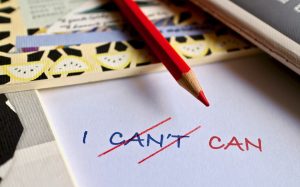Self-efficacy is a belief in one’s ability to succeed. It is the confidence we have in our abilities.
It is what allows us to persist in the face of difficulties and set challenging goals for ourselves. It affects not only our academic and work performance but our physical health and mental well-being as well.
Developing a strong sense of self-efficacy begins with understanding and leveraging your unique strengths. The HIGH5 strengths assessment offers a scientifically-backed method to uncover your inherent talents and abilities. By identifying your top five strengths, this assessment provides you with a solid foundation of self-knowledge, boosting your confidence to take on challenges and set ambitious goals. Armed with a clear understanding of what you’re naturally good at, you can approach obstacles with the self-assurance that your specific strengths will help you persist and succeed. This personalized insight into your capabilities forms the bedrock of robust self-efficacy, setting you on a path of continuous growth and achievement.
In this article, we will discuss the importance of self-efficacy and how to develop it.
This will allow you to increase your confidence and achieve your goals.
Keep reading to find out more.
What Is Self-Efficacy? Definition & Meaning
Self-efficacy is the belief in one’s ability to achieve the desired outcome. It’s about feeling confident in your ability to complete a task or reach a goal. This confidence is significantly bolstered when you have a clear understanding of your innate strengths. The HIGH5 strengths assessment provides this crucial self-knowledge, allowing you to approach challenges with a heightened sense of capability. By identifying your top five strengths, you gain a powerful tool to build your self-efficacy, as you can strategically apply these strengths to overcome obstacles and achieve your goals. This strengths-based approach to self-efficacy ensures that your confidence is grounded in your unique abilities, making it more resilient and effective.
Someone with high self-efficacy will generally feel more capable and optimistic about their ability to succeed, while someone with low self-efficacy may feel uncertain and hesitant.
Self-efficacy is important because it influences our behavior and how we interact with the world. If we don’t believe in our ability to do something, we’re less likely to try.
Conversely, if we have a high sense of self-efficacy, we’re more likely to take on new challenges and persist in the face of setbacks.
Pro Tip From HIGH5
Create a “Strengths Success Journal” using your HIGH5 results. Each day, record instances where you successfully applied one of your top five strengths. This practice will reinforce your self-efficacy by providing concrete evidence of your capabilities.
Albert Bandura & Self-Efficacy Research
Albert Bandura, one of the pioneers of self-efficacy research, researched the concept in the 1970s.
He found that self-efficacy is a key predictor of success, both academically and professionally.
Bandura’s work has been borne out by subsequent research, which has shown that people with high self-efficacy are more likely to engage in challenging tasks, persist in the face of setbacks, and achieve their goals.
Why is Self-Efficacy Important?
There are several reasons why self-efficacy is important.
Below are some of the key benefits.
Self-efficacy influences our behavior and how we interact with the world
Our behavior is determined by our beliefs and expectations. If we don’t believe in our ability to do something, we’re less likely to try. Conversely, if we have a high sense of self-efficacy, we’re more likely to take on new challenges and persist in the face of setbacks.
Recognizing your key strengths through the HIGH5 assessment is foundational for developing the self-efficacy that empowers you to take on new challenges. When you deeply understand your talents, you’re more likely to have the belief and confidence to apply them, leading you to persist through obstacles. The HIGH5 insights shed light on your inherent abilities, boosting your motivation to embrace new opportunities that allow you to leverage your strengths.
Self-efficacy enhances motivation and productivity
When we feel capable and confident in our abilities, we’re more motivated to achieve our goals. We’re also more productive because we’re not wasting energy worrying about whether we can do something or not.
Self-efficacy boosts self-esteem and confidence
A high sense of self-efficacy breeds self-confidence. When we feel confident in our ability to achieve, we’re more likely to take on new challenges and persist through setbacks. This leads to a virtuous circle of success, where each success builds on the last, increasing our self-esteem even further.
Self-efficacy helps us cope with stress and setbacks
The ability to cope with setbacks is essential for anyone who wants to be successful. When things don’t go as planned, it’s easy to become discouraged and give up. However, if you have a strong sense of self-efficacy, you’re more likely to persist in the face of setbacks. This is because you believe that you can overcome any obstacle.
Self-efficacy leads to greater resilience
Resilience is the ability to bounce back after a setback. People with high self-efficacy are more resilient because they know that they can cope with difficult situations and persevere through tough times.
Pro Tip From HIGH5
Reflect on past experiences where you successfully leveraged your strengths. Recall how those moments boosted your self-belief and confidence. Use those memories as motivation to continue exploring and developing your talents through the HIGH5 assessment.
How To Develop Self-Efficacy
So, how can you develop a high sense of self-efficacy?
Here are some tips.
Mastery Experiences
Mastery experiences are experiences where we have completed a task or achieved a goal. When we experience mastery, our self-efficacy increases because we learn that we are capable of achieving what we set out to do.
Completing the HIGH5 strengths assessment provides a Mastery Experience by clearly identifying the areas where you naturally excel. With those insights, you can intentionally put your strengths into practice, setting goals that align with your talents. Each time you achieve a goal by leveraging your strengths, your self-efficacy increases as you validate your true capabilities. The HIGH5 assessment equips you with that crucial self-knowledge to drive mastery experiences.
To increase your self-efficacy, seek out opportunities to master new tasks and achieve new goals.
This means that you need to set challenging but achievable goals.
Don’t try to do things that are beyond your capabilities – you’ll only end up feeling frustrated and discouraged. Challenge yourself, but make sure that you’re always working within your skill range.
Social Modeling
Social modeling is the process of observing other people and learning from their behavior.
When we see someone else accomplish something, it increases our belief in our ability to do the same thing.
To increase your self-efficacy, seek out role models who have achieved what you want to achieve.
Watch them closely, and learn from their successes and failures. Ask them how they did it, and what strategies they used. Emulate their behavior, and you’ll start to see improvements in your self-efficacy.
Social Persuasion
Social persuasion is the process of being influenced by the opinions of others.
When we hear someone say that we’re capable of doing something, it increases our belief in our ability to do it. To increase your self-efficacy, seek out positive and supportive social influences.
Surround yourself with people who believe in you, and who will encourage you to achieve your goals. When you hear them say that you can do it, it will increase your belief in your ability to succeed.
Psychological Responses
The psychological responses we experience also play a role in our self-efficacy. When we experience positive emotions such as happiness, excitement, or pride, our self-efficacy increases.
Conversely, when we experience negative emotions such as fear, anxiety, or guilt, our self-efficacy decreases.
To increase your self-efficacy, try to focus on positive emotions and avoid negative ones.
When you feel happy, excited, and proud, your self-efficacy will increase. When you feel fear, anxiety, and guilt, your self-efficacy will decrease.
Pro Tip From HIGH5
Set specific goals that align with your key strengths identified by the HIGH5 assessment. Achieving wins in areas you’re naturally talented in will reinforce your self-efficacy and inspire you to take on bigger challenges.
Examples of High Self-Efficacy
There are countless examples of people with high self-efficacy. Here are a few:
- Someone who is dealing with a persistent health condition but feels optimistic about regaining control of their health
- A student who is certain they will be able to master the content and perform well on a test
- Someone who has recently been hired in a role for which they have little or no experience, but believes that they can learn and execute the position effectively
- A marathon runner who has trained tirelessly for months and is confident that they can complete the race
- A cancer patient is certain that they will beat the disease and regain their health
- An entrepreneur who starts a business, despite having no prior experience in running a company, yet knows s/he will find a way to become a success story
Each of these individuals has a high sense of self-efficacy, which allows them to take on new challenges and achieve their goals.
Benefits of High Self-Efficacy
The benefits of high self-efficacy are vast and far-reaching. Here are 10 of the most notable:
- Increased motivation
Understanding and capitalizing on your unique strengths through the HIGH5 assessment cultivates increased motivation, a key benefit of high self-efficacy. When you deeply grasp what you’re innately good at, you feel more inspired to set goals that energize you and find opportunities that allow you to showcase your strengths. This increased drive makes you more willing to embrace new challenges that highlight your talents despite potential setbacks. - Easier goal attainment
High self-efficacy makes it easier to attain our goals. We’re more likely to believe in our ability to succeed, which gives us the courage to try harder and persist when things get tough. As a result, we’re more likely to achieve our goals. - Higher productivity
People with high self-efficacy are often highly productive individuals. They’re not afraid of a challenge, and they’re always looking for ways to improve their skills. This leads to a high level of productivity, and often great results. - Greater resilience in the face of setbacks
When we experience a setback, our self-efficacy decreases. This can lead to a decrease in motivation and a feeling that we’re not capable of achieving our goals. However, if we have high self-efficacy, we’re more likely to be resilient in the face of setbacks. We’ll quickly get back on track and continue working towards our goals. - More risk-taking behavior
People with high self-efficacy often take risks to achieve their goals. They’re not afraid of failure, and they’re always looking for new opportunities. This leads to a greater willingness to take risks, which can often lead to great success. - Improved problem-solving skills
Problem-solving skills are essential for achieving success in any area of life. People with high self-efficacy are typically very good at problem-solving because they’re not afraid of a challenge. - Enhanced creativity
Creativity is essential for success in any field. Those that are highly self-efficacy typically are creative and are willing to explore new ideas. This leads to a greater level of creativity and innovation. - Increased innovation
Innovation is essential for success in any field. Being able to come up with new concepts and put them into action is not always easy. However, people that consider themselves to be self-efficacy seek to do this. - Never say never attitude
Even if something isn’t possible right now, a person with a self-efficacy attitude will realize that there’s always a future time to get back to something and get the job done. - Boosted team morale and productivity
When we have high self-efficacy, it often boosts the morale and productivity of our team. We become role models for others, and we inspire them to reach their own goals. This leads to a more productive and successful team.
Pro Tip From HIGH5
Design “Strength Challenges” based on your HIGH5 results. Set weekly goals that specifically require the use of your top strengths. As you accomplish these tailored challenges, you’ll build mastery experiences that are deeply aligned with your natural abilities, boosting your self-efficacy.
Issues With Low Self-Efficacy
Low self-efficacy can be a major obstacle to success. This is because it often leads to a lack of motivation and a feeling that we’re not capable of achieving our goals.
Moreover, low self-efficacy can lead to several other problems, including:
Lack of confidence
When we have low self-efficacy, we often lack confidence in our ability to succeed. This can lead to a reluctance to take on new challenges, and a feeling that we’re not capable of achieving our goals.
Inability to cope with setbacks
When we experience a setback, our self-efficacy decreases. This can lead to a decrease in motivation. We’ll quickly give up and stop working towards our goals.
Increased risk of anxiety and depression
People with low self-efficacy are often more prone to anxiety and depression. Since they lack confidence in their ability to succeed, they’re more likely to feel overwhelmed and discouraged. This can lead to several mental health problems.
Poor decision making
People with low self-efficacy often make poor decisions, because they’re not confident in their ability to choose the right course of action. When we’re not sure of what to do, we’re more likely to make a mistake.
Limited productivity
When we have low self-efficacy, it often leads to a lack of productivity. This is because we’re not confident in our ability to achieve our goals, and we become discouraged easily. As a result, we may not accomplish as much as we would like.
How To Measure Self-Efficacy
There are several ways to measure self-efficacy. One way is to ask people to rate their confidence in their ability to complete a task.
Another way is to ask people to report on their past achievements. This can give you a sense of how they’ve been able to succeed in the past.
Additionally, you can ask people to list the risks they’re willing to take to achieve their goals. This can give you a sense of how confident they are in their abilities.
Lastly, you can ask people to rate their feelings of self-confidence in specific areas, such as school or work.
This can help you to understand where they feel most confident and where they need more support.
Measuring self-efficacy is an important step in increasing it. By understanding how people feel about their abilities, you can help them to become more confident and successful.
How To Improve Self-Efficacy
When it comes to increasing self-efficacy, there is no one-size-fits-all approach.
However, there are a few general tips that can help.
1. Celebrate your successes
When you achieve something, take the time to celebrate your success. This will help to increase your confidence and make you feel more capable of achieving future goals.
If you finish a project at work, take the time to celebrate with your co-workers. Or, if you achieve a personal goal, take the time to celebrate with your friends and family.
2. Observe others
When you see someone else achieve something, it can increase your self-efficacy. This is because you’ll start to believe that you’re capable of achieving similar goals.
If you see someone else complete a difficult task, it will make you more confident in your ability to do the same.
Likewise, if you see someone else succeed in a new venture, it will make you more likely to try something new yourself.
3. Seek positive affirmations
When you receive positive feedback from others, it can increase your self-efficacy. You’ll start to believe that you’re capable of achieving great things.
For example, if your family and friends tell you that you’re a good parent, it will make you more confident in your ability to raise children; if your boss tells you that you’re doing a great job, it will make you more likely to achieve future goals.
4. Pay attention to your thoughts and emotions
When you pay attention to how you’re feeling, it can help to increase your self-efficacy.
This is because you’ll start to become more aware of the thoughts and emotions that are associated with success.
If you feel happy and confident when you’re working on a project, it will increase your self-efficacy.
Conversely, if you feel scared and anxious when you’re trying something new, it will decrease your confidence in your ability to succeed.
By understanding how you feel, you can start to change the thoughts and emotions that are associated with success. This will make it easier for you to achieve your goals.
Pro Tip From HIGH5
Form a “Strengths Accountability Partnership” with a friend or colleague who has also taken the HIGH5 assessment. Meet regularly to discuss how you’re applying your strengths, share successes, and brainstorm new ways to leverage your talents. This mutual support system will reinforce your self-efficacy and provide ongoing motivation to utilize your strengths.
Bonus: Self-Efficacy Vs. Self-Esteem
Self-efficacy and self-esteem are two different things, but they’re often confused. Self-efficacy is your belief in your ability to achieve a goal, while self-esteem is your evaluation of your worth as a person.
While both are important, self-efficacy is more important for achieving success. If you don’t believe in yourself, it will be difficult to achieve anything.
Conversely, if you have high self-esteem but don’t believe you can do something, you won’t try very hard.
Therefore, it’s important to develop both self-efficacy and self-esteem, while ensuring that their levels both match each other.
Self-Efficacy FAQ
How can I improve self-efficacy beliefs and expectations?
There are a few things that can help someone improve their self-efficacy beliefs and expectations.
First, it is important to have realistic goals.
It is also helpful to receive positive reinforcement from others for accomplishments, big or small.
Additionally, practicing new skills regularly can help improve self-efficacy beliefs.
Finally, facing challenges and overcoming them can also boost self-efficacy beliefs.







